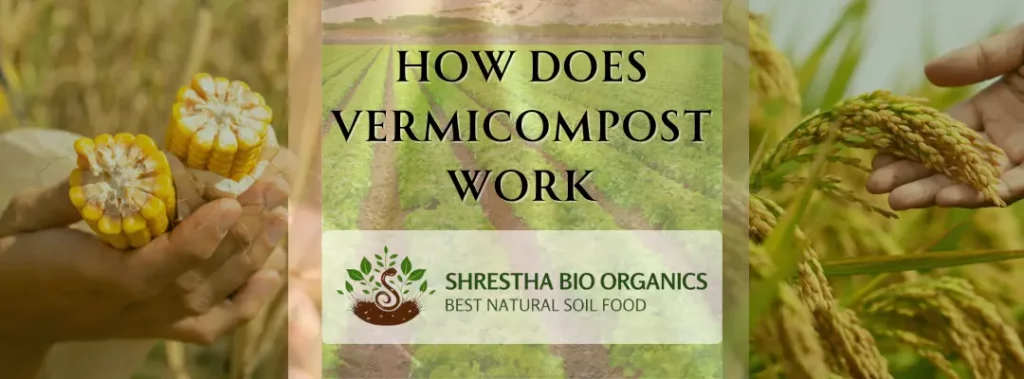
How Does Vermicompost Work?
Introduction:
Vermicompost, also known as worm castings or worm manure, is a nutrient-rich soil amendment produced by the decomposition of organic matter by earthworms. It is considered to be one of the best soil conditioners available, as it is rich in nutrients, improves soil structure, and enhances plant growth.
What is Vermicompost?
Vermicompost is a dark, crumbly material that is produced by earthworms as they consume organic matter. The earthworms’ digestive process breaks down the organic matter into a form that is readily available for plants to absorb. Vermicompost is also known for its high concentration of beneficial microorganisms, which can help to improve soil health and suppress plant diseases.
Why Use Vermicompost?
There are many benefits to using vermicompost in your garden. Here are just a few:
- Improves soil structure: Vermicompost helps to improve soil structure by adding organic matter and increasing pore space. This can help to improve drainage, aeration, and water retention in the soil.
- Enhances plant growth: Vermicompost is a rich source of nutrients, including nitrogen, phosphorus, and potassium, which are essential for plant growth.
- Suppresses plant diseases: Vermicompost contains beneficial microorganisms that can help to suppress plant diseases.
- Reduces waste: Vermicomposting is a great way to reduce food waste.
How Does Vermicomposting Work?
Vermicomposting is a simple process that can be done indoors or outdoors. To get started, you will need a bin, bedding material, and earthworms. You can then start adding food scraps to your bin. The earthworms will eat the food scraps and produce vermicompost.
What is the Best Bedding Material for Vermicomposting?
The best bedding material for vermicomposting is a material that is high in organic matter and has a good moisture content. Some good options include shredded newspaper, cardboard, or coco coir.
What Types of Food Scraps Can I Use for Vermicomposting?
You can use a variety of food scraps for vermicomposting, including fruits, vegetables, coffee grounds, and tea bags. However, there are a few food scraps that you should avoid, such as meat, dairy, and oily foods.
How Long Does It Take to Produce Vermicompost?
It typically takes several months to produce vermicompost. The exact amount of time will vary depending on the type of bedding material, the amount of food scraps, and the type of earthworms you are using.
How Do I Harvest Vermicompost?
There are a few different ways to harvest vermicompost. One method is to simply remove the worms from the bin and then sift out the vermicompost. Another method is to use a “bait and switch” method. This involves adding a new layer of bedding material to the top of the bin and then attracting the worms to this new layer. Once the worms have moved to the new layer, you can remove the old layer of vermicompost.
Where Can I Find Vermicompost?
You can purchase premium quality vermicompost from Shrestha Bio Organics. Shrestha Bio Organics is a leading manufacturer of organic vermicompost, organic khad, and organic fertilizers. They use only the finest ingredients and employ sustainable practices to produce their products.
If you are looking for premium quality vermicompost, look no further than Shrestha Bio Organics. We are a leading manufacturer of organic vermicompost, organic khad, and organic fertilizers. We use only the finest ingredients and employ sustainable practices to produce our products. Our vermicompost is rich in nutrients and is perfect for improving soil health and enhancing plant growth.

A: Vermicompost, also known as worm castings or worm manure, is a nutrient-rich soil amendment produced by the decomposition of organic matter by earthworms. It is considered to be one of the best soil conditioners available, as it is rich in nutrients, improves soil structure, and enhances plant growth.
A: There are many benefits to using vermicompost in your garden. Here are just a few:
- Improves soil structure
- Enhances plant growth
- Suppresses plant diseases
- Reduces waste
A: Vermicomposting is a simple process that can be done indoors or outdoors. To get started, you will need a bin, bedding material, and earthworms. You can then start adding food scraps to your bin. The earthworms will eat the food scraps and produce vermicompost.
A: The best bedding material for vermicomposting is a material that is high in organic matter and has a good moisture content. Some good options include shredded newspaper, cardboard, or coco coir.
A: You can use a variety of food scraps for vermicomposting, including fruits, vegetables, coffee grounds, and tea bags. However, there are a few food scraps that you should avoid, such as meat, dairy, and oily foods.
A: It typically takes several months to produce vermicompost. The exact amount of time will vary depending on the type of bedding material, the amount of food scraps, and the type of earthworms you are using.
A: There are a few different ways to harvest vermicompost. One method is to simply remove the worms from the bin and then sift out the vermicompost. Another method is to use a “bait and switch” method. This involves adding a new layer of bedding material to the top of the bin and then attracting the worms to this new layer. Once the worms have moved to the new layer, you can remove the old layer of vermicompost.
A: Vermicompost and compost are both nutrient-rich soil amendments produced by the decomposition of organic matter. However, there are a few key differences between the two. Vermicompost is produced by earthworms, while compost is produced by a variety of microorganisms, including bacteria and fungi. Vermicompost is generally considered to be a higher quality soil amendment than compost, as it is richer in nutrients and has a higher concentration of beneficial microorganisms.
A: Yes, vermicompost is safe to use on all plants. In fact, it is a great way to improve the health of your plants and promote growth.
A: You can apply vermicompost to your plants as often as you like. However, a good rule of thumb is to apply it once a month during the growing season.
A: You can purchase premium quality vermicompost from Shrestha Bio Organics. Shrestha Bio Organics is a leading manufacturer of organic vermicompost, organic khad, and organic fertilizers. They use only the finest ingredients and employ sustainable practices to produce their products.
-
Sustainable Agriculture Vermicompost UAE
Sustainable Agriculture Vermicompost UAE Introduction Shrestha Bio Organics is a top-quality vermicompost... -
Affordable Vermicompost For Agriculture UAE
Affordable Vermicompost For Agriculture UAE Introduction Shrestha Bio Organics is a top-quality... -
Organic Farming Vermicompost UAE
Organic Farming Vermicompost UAE Introduction Shrestha Bio Organics is a top-quality vermicompost... -
Organic Vermicompost For Agriculture UAE
Organic Vermicompost For Agriculture UAE Introduction Shrestha Bio Organics is a top-quality... -
Natural Vermicompost Fertilizer in UAE
Natural Vermicompost Fertilizer in UAE Introduction Shrestha Bio Organics is a top-quality... -
Organic Fertilizer For Vermicompost UAE
Organic Fertilizer For Vermicompost UAE Introduction Shrestha Bio Organics is a top-quality... -
Organic Vermicompost Farming Solutions UAE
Organic Vermicompost Farming Solutions UAE Introduction Shrestha Bio Organics is a top-quality... -
Vermicompost For Organic Farming UAE
Vermicompost For Organic Farming UAE Introduction Shrestha Bio Organics is a top-quality... -
Urban Garden Vermicompost UAE
Urban Garden Vermicompost UAE Introduction Shrestha Bio Organics is a top-quality vermicompost... -
Water Retaining Organic Fertilizer UAE
Water Retaining Organic Fertilizer UAE Introduction Shrestha Bio Organics is a top-quality... -
Certified Vermicompost Supplier UAE
Certified Vermicompost Supplier UAE Introduction Shrestha Bio Organics is a top-quality vermicompost... -
Neem Enriched Vermicompost UAE
Neem Enriched Vermicompost UAE Introduction Shrestha Bio Organics is a top-quality vermicompost... -
Vermicompost For Gardening UAE
Vermicompost For Gardening UAE Introduction Shrestha Bio Organics is a top-quality vermicompost... -
Soil improvement Vermicompost UAE
Soil improvement Vermicompost UAE Introduction Shrestha Bio Organics is a top-quality vermicompost... -
Premium Vermicompost For UAE Farms
Premium Vermicompost For UAE Farms Introduction Shrestha Bio Organics is a top-quality...


